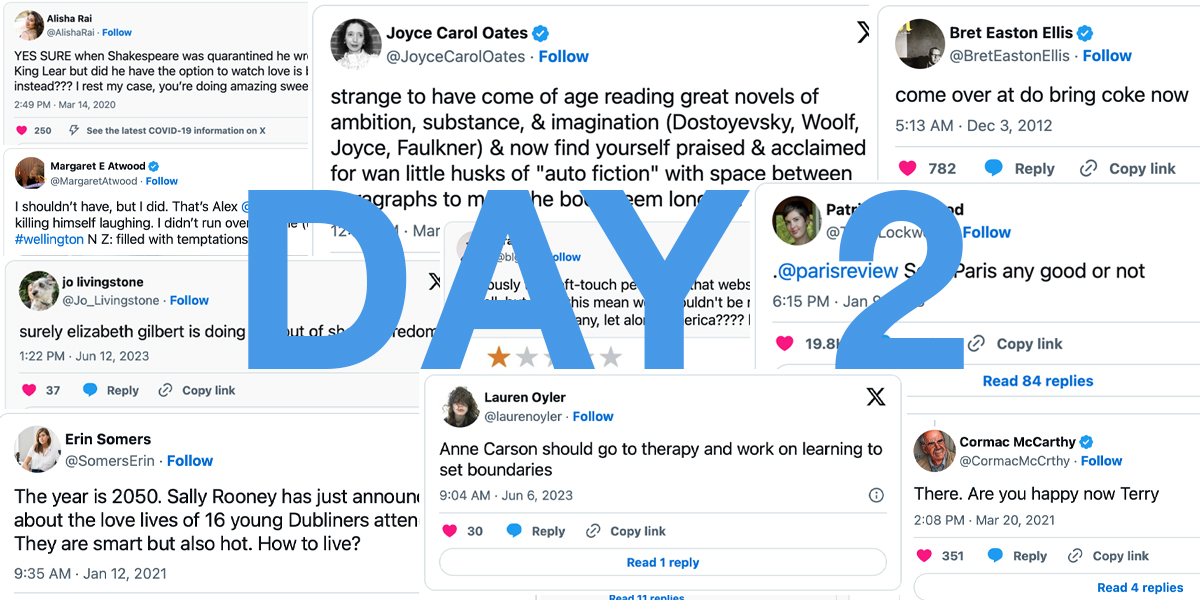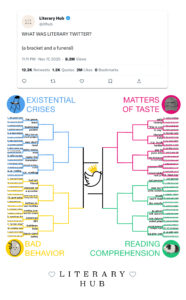Welcome to day two of What Was Literary Twitter!
Plenty of you voted yesterday in our first round of polling, and it was exciting to go though the results. The top seeds sailed through, YA won all its match-ups, and the plagiarists couldn’t deceive their way out of round one.
A few more notable results that caught my eye:
It was clear in the first round that voters were (mostly) choosing Twitter-native phenomenons over larger discourses that were widely discussed on Twitter: a connoisseur’s distinction. For instance, AI apocalypse lost to King Lear as Covid project (this also proves once again that book people are some of the biggest LLM haters on the planet), and MFA vs. NYC lost to Name the Translator, which, of course, had a hashtag. Men don’t read did edge out Duchess Goldblatt, but they were just a couple votes apart: 0.2% away from a dead tie. Just to clarify for the future: in the case of a 50-50, down the middle finish, we’ll flip a copy of The Coin to determine the winner.
I was surprised to see Lauren Oyler pan day lose to people getting mad about bookshelf organizing, in another squeaker. The Lit Hub Slack is disappointed in you. Could this be another another indication that criticism is on the decline?
I was also hoping Patricia Lockwood’s “So is Paris any good or not” would go farther. It’s such a perfect joke, so well written (the opening “so,” the phrasing, starting with the @ tag!) but some things are just too beautiful and burn too brightly for this world, I suppose.
Glad to see the Natalie Portman and Jonathan Safran Foer emails make it to round two. As a Twitter posting phenomenon the emails were a blast, but they’ve stayed on my mind because they feel much too close to my own emailed flirtations. Maybe it should be heartening that everyone sounds a little embarrassing when they try to make their daily life sound sexy and mysterious, and end up unspooling purple prose about the sound of guinea pigs. (This is James by the way—don’t want to include the whole staff under my umbrella of poor coquetry.)
Some interesting match-ups today in round two, though. In the Matters of Taste corner, there’s a good pairing of iconic Twitter accounts in Merriam-Webster vs @GuyInYourMFA. Nearby, R.I.P. Literary Twitter vs. literary hats is a fun, slightly oblique referendum on the future of media. And I’m wondering if Margret Atwood on a scooter can possibly outmaneuver the Bad Art Friend drama. Would love to see Atwood keep scooting.
It’s in your hands now, dear reader!
Behold, the updated Bracket:
[Click to enlarge]
Rules
Now that Literary Twitter is dead, we’re asking, “What was it?” In this bracket, we’re seeking the Most Literary Twitter moment, discourse, or personage. What has been stuck in your mind, who sent you running to your group chat, what kept you scrolling for longer than you should have? What are you still bringing up in conversation today and having to explain to people with normal brains? In short, what most exemplified whatever the hell Literary Twitter was?
We’ve sorted all of the contenders (that we can remember) into four categories: Existential Crises, Matters of Taste, Bad Behavior, and Reading Comprehension. Each quadrant’s winner will face off on Friday, before the final head-to-head on Monday, November 24th to crown our winner.
Voting Schedule
Round of 64 Character Limit: Voting open now until tonight at 7:00 PM EST (Check out the results here)
You are here –> Round of “dang, only 32 likes?”: Voting open Tuesday, November 18th from 10:00 AM – 7:00 PM EST
Round of “sweet, 16 new followers”: Voting open Wednesday, November 19th from 10:00 AM – 7:00 PM EST
The Retweeted 8: Voting open Thursday, November 20th from 10:00 AM – 7:00 PM EST
The Quarter Finals: Voting open Friday, November 21st from 10:00 AM, until Sunday November 23rd at 7:00 PM EST
The Finals: Voting open Monday, November 24th from 10:00 AM – 7:00 PM EST
And the winner will be announced on Tuesday, November 25th!
How To Vote
We’ve got handy voting forms embedded below. Like looking back at the old Twitter interface, they’re a little ugly, but they get the job done. Simply select which of the two discourses you think should advance, and we’ll tabulate the votes at the end of each day.
Scroll on….
the genre wars (1) vs. #PublishingPaidMe (9)

the genre wars (1)
Trending Because: One of the foundational debates in books that raises a million discoursable questions: Is it pretentious to refuse to read fantasy? Is it escapist to only read sci fi? What even differentiates genre and literature? Is a book inherently unserious if it has dragons? Can you “elevate” a fantasy story with elves by giving them a trauma backstory? What makes a “real book”? Isn’t “literary fiction” actually just its own genre? All of these important (?) issues were discussed ad nauseam on the old Literary Twitter. And then discussed again. And again. And again, as if some biological clock were repeating its cloying chime, leading us brightly down the road to our collective intellectual doom. As The Guardian tweeted, “literature vs genre is a battle where both sides lose.”
Retweeted by: GoodReads power users and grad students aspiring for tenure track
VS.
#PublishingPaidMe (9)
Trending Because: At its best, Twitter was amazing as an organizing tool: you could yell at powerful people who were usually holed away in their ivory towers and you could share information they were trying to hide from the rest of us. Black writer L.L. McKinney started the hashtag #PublishingPaidMe to draw attention to the disparity between what Black and white authors were getting paid for deals. And it took off: Big name authors joined in to share what they made, and it got the attention of publications like The Times, NPR, and Vulture too. As much as people poo-pooed Twitter organizing as slacktivism, this sort of crowd-sourced transparency had its uses.
Retweeted by: The angry and underpaid
king lear as aspirational covid project (12) vs. men don’t read (4)

shakespeare wrote king lear in quarantine, and maybe so can you? (12)
Trending Because: In the COVID spring of 2020, Literary Twitter seemed to think you had two options when stuck inside: sourdough baking and writing a classic of English literature. Very early in lockdown, Rosanne Cash posted on Twitter: “Just a reminder that when Shakespeare was quarantined because of the plague, he wrote King Lear.”
We had a lot of time to post about this, and really made the most of it. In fact, with all the time we spent posting about writing King Lear, a lot of us probably really could have written a King Lear.
Retweeted By: Novelists with agents emailing them about overdue rewrites, people who post about their WIP, Shakespeare nerds
VS.
men don’t read (4)
Trending Because: American men have been around for almost 250 years now, but no one has yet managed to figure them out. A recent flashpoint in the Men Debates is whether they like books or not. The data points to the fact that men aren’t reading that many novels—or books in general—but the vibes are pointing in a thousand different directions.
There are some excellent long pieces on the phenomenon, but on Twitter the debate has consisted mostly in how reading Blood Meridian is like grunting, under thirty-five year olds reading is the ick, or “books is a woman things.”
Retweeted by: Worried book club members.
shitty media men (6) vs. name the translator (14)

shitty media men (6)
Trending Because: “Shitty Media Men” began in October of 2017 as an anonymous Google spreadsheet. Maybe you remember it coming through your inbox. (It was forwarded to multiple women in the Lit Hub office.) Even if you were never actually sent it, you probably remember the social media (and regular media) shit (ha ha) storm it kicked off.
The spreadsheet was just what it said on the tin: a list of shitty men in media: editors, writers, publishers, etc. Anyone could contribute anonymously, and the shittiness ranged from rape to creepy behavior to flirting. It had been intended as a sort of digital whisper network—the rules listed at the top of the document were “Please never name an accuser, and please never share this document with a man.” There was also a disclaimer, which read “This document is only a collection of misconduct allegations and rumors. Take everything with a grain of salt. If you see something about a man you’re friends with, don’t freak out. Men accused of physical sexual violence by multiple women are highlighted in red.” The document was only live for about 12 hours; by the time it was taken down (because BuzzFeed was planning to write about it publicly) it featured over 70 names and had gone hugely viral, at least in media circles, which very much includes our own Literary Twitter.
Three months later, an editor named Moira Donegan published an essay in The Cut outing herself as the creator of the Shitty Media Men list—in large part because Katie Roiphe was planning to dox her in Harper’s magazine, which Donegan learned through a fact-checker.
“I was incredibly naïve when I made the spreadsheet,” she wrote. “I was naïve because I did not understand the forces that would make the document go viral. I was naïve because I thought that the document would not be made public, and when it became clear that it would be, I was naïve because I thought that the focus would be on the behavior described in the document, rather than on the document itself. It is hard to believe, in retrospect, that I really thought this. But I did.”
There was controversy over the list itself; there was controversy over its design, its purpose, its ownership, and of course there was controversy when it came out that Roiphe planned to name Donegan.
“People who opposed the decision by Harper’s speculated about what would happen to me as a result of being identified,” Donegan writes. “They feared that I would be threatened, stalked, raped, or killed. The outrage made it seem inevitable that my identity would be exposed even before the Roiphe piece ran. All of this was terrifying. I still don’t know what kind of future awaits me now that I’ve stopped hiding.”
As for Roiphe, in the eventual Harper’s piece, she wrote:
Before the piece was even finished, let alone published, people were calling me “pro-rape,” “human scum,” a “harridan,” a “monster out of Stephen King’s ‘IT,’?” a “ghoul,” a “bitch,” and a “garbage person”—all because of a rumor that I was planning to name the creator of the so-called Shitty Media Men list. The Twitter feminist Jessica Valenti called this prospect “profoundly shitty” and “incredibly dangerous” without having read a single word of my piece. Other tweets were more direct: “man if katie roiphe actually publishes that article she can consider her career over.” “Katie Roiphe can suck my dick.”
Twitter. It was great for everyone!
Retweeted by: Everyone in your office
VS.
name the translator (14)
Trending Because: Translators make the literary world go round, and thanks to Twitter, they started to get more of the respect they’re owed. On September 30th, 2021—International Translators Day—Jennifer Croft (translator of Olga Tokarczuk’s Booker-winning Flights) and Mark Haddon (author of The Curious Incident of the Dog in the Night-Time) circulated an open letter asking that translators be named on the cover of the books they’ve translated. The letter and accompanying hashtag took off, prompting Pan Macmillan UK to put their translators more front and center, and other Big Fives pledged to do better, too.
Twitter activism does sometimes work!
Retweeted by: Everyone outside of the anglophone navel-gazing and tired of all the English
is it ableist to say writers should read? (10) vs. j.k. rowling (2)

is it ableist to say writers should read? (10)
Trending Because: The trick to Twitter was to be just popular enough. There has always been a hard ceiling on the benefits of virality: you want to be popular, but never the main character.
One of the most searing examples of this dynamic was when Ana Mardoll got the main character treatment after posting a now deleted Tweet saying it’s ableist to expect writers to read. Weird stuff, by all accounts, and this was such an attention-grabbing take that it also led people to discover that Mardoll was a neoptism hire at the giant weapons company Lockeed Martin, in addition to being a writer. If you don’t remember the details (and want to), Brandon Yu helpfully rounded up the whole story here.
Writing, building bombs, and posting wild takes? That’s the American Dream right there.
Retweeted by: Drone pilots who love YA
VS.
j.k. rowling (2)
Trending Because: In the last six(ish) years, J.K. Rowling has gone from the beloved author of a beloved children’s book series to a gleeful TERF who has destroyed her own cultural legacy and betrayed the world she created. It seems inevitable now, but the truth is, at the risk of a statement so universal as to be meaningless, everything might have been different if she just hadn’t had Twitter.
Case in point: the slide to TERFdom actually began in 2018, when J.K. Rowling liked a tweet that called trans women “men in dresses,” but wrote it off as an accident. “I’m afraid J.K. Rowling had a clumsy and middle-aged moment and this is not the first time she has favorited by holding her phone incorrectly,” a spokesperson said.
In 2019, Rowling followed the transphobic YouTuber Magdalen Berns; people noticed. But they really noticed when she tweeted support for a woman named Maya Forstater, who was fired for making transphobic statements.
“Not only is it a transphobic take, it’s also a boring one—‘sex is real’ is a tired (though still harmful) trope of transphobia that upholds binary-driven views of sex and gender, ignoring the reality of intersex and non-binary individuals, in addition to the humanity of trans people,” our editor Corinne Segal wrote at the time.
Then, in June 2020, when we were all in a really bad mood (which has lasted until this moment), she leveled up, tweeting this out:
‘People who menstruate.’ I’m sure there used to be a word for those people. Someone help me out. Wumben? Wimpund? Woomud?
Opinion: Creating a more equal post-COVID-19 world for people who menstruate https://t.co/cVpZxG7gaA
— J.K. Rowling (@jk_rowling) June 6, 2020
At this point, the backlash was intense and growing. Rowling published an essay explaining herself on her website. Actors from the Harry Potter universe began to speak out against Rowling’s tweets. Also, for a reason I can only suppose had to do with an undisclosed pettiness competition, when Stephen King tweeted “Trans women are women,” Rowling deleted one of her own tweets praising him.
In September, Rowling published a novel under her pseudonym Robert Galbraith, about a fictional serial killer who dressed as a woman. Again, Twitter noticed, to the degree that the Times of London published an open letter signed by writers like Ian McEwan, Tom Stoppard, and Lionel Shriver, decrying “an insidious, authoritarian and misogynistic trend in social media.” London bookshop The Second Shelf responded with their own open letter, signed by writers like Jeannette Winterson, Max Porter, Daisy Johnson, and Naoise Dolan, which argued that “Culture is, and should always be, at the forefront of societal change, and as writers, editors, agents, journalists, and publishing professionals, we recognise the vital role our industry has in advancing and supporting the wellbeing and rights of trans and non-binary people.”
Honestly, at that point, the hits kept on coming, but the die was cast. You can keep torturing yourself with the excellent play-by-plays here and here if you want to. (Maybe it was the black mold all along??) Also, did you know that there is an entire Wikipedia page entitled “Political views of J.K. Rowling”? Now you do.
Now, all that’s left to what was once Potter Twitter is to figure out what to do about their Deathly Hallows tattoos.
Retweeted by: Pamela Paul
sally rooney (1) vs “this is just to say” as meme poem (8)

sally rooney (1)
Trending Because: It might not be fair to assign the Sally Rooney Discourse to Twitter, because the outsize hype was (is?) everywhere. (Remember the tote bags? The bucket hats? The coffee carts? The pop-up shop? The mural? Remember how Beautiful World, Where Are You became the most widely reviewed book in recent memory?) But when Normal People came out (2018), and also when Beautiful World, Where Are You came out (2021), and also when Intermezzo came out (2024), Literary Twitter had particularly no chill. And why not? She was (is?) “the first great millennial writer!” Sally Rooney was (is?) a Marxist! Or a poser! Taylor Swift once said she liked her. Her writing is highbrow, or is it lowbrow? Is it cool to like her, or lame? Actually, you know what, it’s all best described in the form of a Mad Lib:
Did you hear that a new Sally Rooney novel will be published in [MONTH]? Personally, I am [HYPERBOLIC ADJECTIVE]. I [FEELINGS VERB] Sally Rooney’s novels because they’re easy and enjoyable to read. She writes in the tradition of [THIN, WHITE WOMAN WRITER], which I think is [VALUE ADJECTIVE].
As an aficionado of literary fiction, I can tell you, without hesitation, that Rooney’s books, with their focus on romantic relationships, are exactly like those of [WRITER], whose books, as we all know, have long been considered [LITERARY GENRE].
I thought Conversations with Friends was [COMPARATIVE VALUE ADJECTIVE] than Normal People because of my feelings about Marxism.
Of course, Sally Rooney is very popular, which as a lover of books I think is a(n) [ADJECTIVE] thing. And as a writer myself, the success of another writer makes me feel [STRONG EMOTION].
All in all, I think Sally Rooney is the [NOUN] of a generation, and no matter what anyone feels about her books, there’s no denying that they’re the perfect thing to photograph with a [KIND OF VASE].
Anyway, lately (though it’s nothing new) Rooney has been making headlines for her unflagging support of Palestine, which has, among other things, recently prevented her from traveling to the UK to accept an award. Some hype is justified.
Also, remember Lorrie Moore’s review of the Normal People adaptation? The one that was actually a (negative) review of millennials? Incredible stuff.
Anyway, this discourse will probably never die. To quote another, now-deleted tweet from Brandon Taylor: “Rooney Tunes, we ride again.” Forever…
Retweeted by: [KIND OF MILLENNIAL]
VS.
“this is just to say” as meme poem (8)
Trending Because:
This is just to say
you have seen
the William Carlos Williams meme poems
that were started
as early as the ‘60s
and which
you have probably
memed
for yourself
Forgive me
they’re all so delicious
so sweet
and so everywhere
Retweeted By: The aspiring poet in all of us and wicked, unapologetic plum thieves
literary hats (5) vs. r.i.p. book twitter (4)

literary hats (5)
Trending Because: Reading is a solitary pursuit, basically. So how will people in the world know that you do it? More to the point, how will people on the internet know that you do it?
Well, one way is to wear a hat, or at least tweet about how you wear one, or how you’d like to wear one. Hence the brief glorious reign of Minor Canon, which popped up on what had then become X to sell some literary hats, which could signal one’s fandom for Lydia Davis, or Rachel Kushner, or Zadie Smith, by saying “Lydia Davis,” or “Rachel Kushner,” or “Zadie Smith” on them.
“Criticism and mockery soon followed,” wrote Wilson Wong in the Times. “The hats were confusing (at $27 apiece, which does not include tax or shipping); posturing (As one observer said: “Wow! You read! And you’ve read books by a woman! That’s so crazy!”); exploitative (Minor Canon did not initially ask the writers for permission to use their names or offer them a cut of its profits).”
Still, people bought them, because in a sea of sports jerseys (?) and band t-shirts, it’s fun to have merch that’s just for us. Now literary hats are everywhere. But the best one is here.
Retweeted by: People who can’t name a football team
VS.
r.i.p. book twitter (4)
Trending Because: What was more Literary Twitter than the handwringing about the fate of Literary Twitter? Musk took it over in October 2022, at which point we were already calling it the Hellsite, spawning a lot of people leaving, or at least promising they were going to leave. Lit Hub did not pull the plug until May 1, 2025, at which time our Editor in Chief Jonny Diamond wrote:
We no longer want to provide free content and engagement to a deranged billionaire and his dysfunctional little clubhouse. I understand the argument that we shouldn’t cede our space in the public square to the bad people, to which I respond: How is a privately owned, algorithmically driven digital service, that suppresses speech it doesn’t like and amplifies speech (often hateful) that it does, anything like a true public square? To take the analogy further: If all your friends have left the town square, and it’s full of hateful morons with the loudest bullhorns, who just want to sell you fallout shelter supplies and dick pills, wouldn’t you leave?
In the meantime, you can find us on Bluesky.
Retweeted by: We don’t know, we aren’t there anymore
guy in your mfa (11) vs. the dictionary is cool (14)

guy in your mfa (11)
Trending Because: Maybe the most memorable Literary Twitter bit account, just edging out @Kim Kierkegaardashian. @GuyInYourMFA embodies the worst version of the stereotypical dude writer who has both too much and too little to say. The tweets nailed the voice of this workshop menace, who was full of references, ideas for novels, takes on feminism, new Moleskines, spelling opinions, musings on writing women, and so much more. And not to brag, but we got to interview “him.”
Retweeted By: Anyone who has taken a workshop with one of these guys
VS.
the dictionary is cool (14)
Trending Because: Way back in 2016, when we talked about “the Resistance” without rolling our eyes, and were still impressed by brands having funny Twitter accounts, Merriam-Webster (yes, the dictionary) emerged as a surprisingly irreverent, informative, and anti-Trump voice on Twitter. It was the mildest kind of resistance, but it was still nice. Good to know the dictionary is on your side.
Retweeted by: Word nerds, people with signs
book organization nazis (10) vs. should adults read ya? (2)

book organization nazis (10)
Trending Because: Scrutinizing people’s bookshelves became a cottage industry during lockdown, but Lit Twitter has always been about that judgmental life. Organizing books by color? We have bizarre thoughts. Fancy shelves? We think it looks “like a Sephora.” Organizing your books at all? We prefer chaos.
Retweeted By: People who know the difference between RGB and CMYK and have strong opinions on Pantone’s color of the year
should adults read ya? (2)
Trending Because: The heat coming off posts about YA could warm a small Nordic country. Most of this passionate (deregatory) posting is about the basic question of whether it’s okay for adults to read young adult books. Is YA a comfort blanket for the morally superior, just simplistic, unchallenging fiction? Has the tastes of YA readers changed publishing? Should the “old hags” complaining about it just shut up?
People simply love to shout about this one. One of the biggest Twitter reactions to a piece of writing I’ve ever seen happened in the wake of Ruth Graham’s “Against YA” essay. The vitriol was so intense that Teddy Wayne included it in an essay on how bad internet outrage has gotten.
Retweeted By: The forever young and the forever mad

bad art friend (1) vs. margaret atwood scoots (8)

bad art friend (1)
Trending Because: Bad Art Friend was the biggest literary story—Twitter or otherwise—of 2021. In case you’ve blocked it out, it all started on October 5, when Robert Kolker published a feature article in The New York Times entitled “Who Is the Bad Art Friend?”. The saga within is almost too convoluted to summarize, but basically, back in 2015, a writer named Dawn Dorland donated one of her kidneys to a stranger and posted about it on Facebook—only to find, sometime later, that another writer, Sonya Larson, an acquaintance via the Boston nonprofit writing org GrubStreet, had written a short story about kidney donation that seemed to borrow heavily from her Facebook posts. Lawsuits, and some staffing changes at GrubStreet, not to mention everyone turning off their history, ensued.
Literally everyone seemed to have a take on this, even people not usually on Literary Twitter. Some read the article and concluded that Dorland was the Bad Art Friend. Others thought it was Larson all along. As our own Walker Caplan put it at the time: “The lesson of “Bad Art Friend” is Cover your tracks when writing fiction about real people; or it’s Never pitch articles about yourself; or it’s Don’t extensively insult your acquaintances in group chats lest they be subpoenaed; or it’s The conflation of friendship and professional connection that the writing world necessitates isn’t good for anyone.” (Lit Hub’s official take is that donating kidneys is good.) It spurred major, frenzied discussions about writing communities, race, class, cringiness, mean girls, the literary industry at large, and of course, the literary internet itself. That’s what staring into a mirror when you are, yourself, a mirror gets you.
(By the way, in 2023 a court ruled that the Bad Art Friend was in fact, both of them.)
Retweeted by: Writers suddenly living in fear of their group chats being subpoenaed; AWP-goers
VS.
margaret atwood scoots (8)
Trending Because: The bastards can’t grind you down if they can’t catch you. While on tour for her book The Testaments in 2020, the Booker winner zipped around a New Zealand parking lot on an electric scooter. You just gotta watch it.
Retweeted By: Transit nerds and older, nostalgic X-Games fans
“come over at do bring coke now” (5) vs. literary hotties vs. non-hotties (13)

“come over at do bring coke now” (5)
Trending Because: This is what Bret Easton Ellis tweeted at 2:13AM (his time) on December 3, 2012. This, apparently a misdirected text to his dealer, has been described as “the greatest tweet of all time.” Years later, he auctioned off the tweet as an NFT.
Retweeted by: People afraid to merge
VS.
literary hotties vs. non-hotties (13)
Trending Because: Like all the best Literary Twitter scuffles, this one was a mere two days of extreme internet outrage, before we all went to go read a book or something. The adaptation of Joyce Carol Oates’s Blonde, starring Ana de Armas as Marilyn Monroe, was in the news, and Terese Marie Mailhot tweeted this: “Joyce Carol Oates shouldn’t have written Blonde. What could a literary non-hottie know about the exploitation of femme, highly sexualized women—women who look and act like Oates have no compassion or love for women like Marilyn. They’re just as bad as men at writing them.”
“Immediately, and for a couple of days afterwards, it was like Christmas morning in the writer’s wing of twitter.com,” wrote our editor Dan Sheehan at the time. “People gleefully discussed the nature (and responsibility) of the literary non-hottie, defended the hotness of young JCO, accused present day JCO of misogyny, accused Mailhot of even more misogyny, and just generally had a grand old time savoring this wonderful new phrase.”
Mailhot clarified her joke, but the storm was already perfect, just like Marilyn Monroe’s hair, and JCO’s skin, and, friends, all of us.
Speaking of literary hotties, did you know that young Victor Hugo looked a lot like Taylor Swift?
Retweeted by: Literary mid-hotties
posting your wordle score (11) vs. american dirt (3)

posting your wordle score (11)
Trending Because: DEBUT: In 2021, Wordle launched online and the homemade indie game immediately grabbed a ton of attention. MONEY: In 2022, the New York Times bought the game for seven figures. VIRAL: For bookish nerds, this game was like catnip. Wordle took over social media, group chats, and our minds. We wondered about the psychology of our obsession, we cheated, we (maybe) acted like assholes to our partners. It short, this cutesy game became an addiction, a threat to our mental health, and a meme on Twitter.
Retweeted by: Adults who still remember their exact SAT scores
VS.
american dirt (3)
Trending Because: In January 2020, Flatiron published Jeanine Cummins’s American Dirt, a book about a Mexican bookseller who finds herself forced to flee (illegally) to America to escape the cartel, which was pitched as “a literary achievement filled with poignancy, drama, and humanity” and “one of the most important books for our times,” and came emblazoned with rapturous blurbs from Stephen King, Sandra Cisneros, Ann Patchett, and Julia Alvarez. It was the talk of the literary town! But, as Lit Hub’s Jonny Diamond wrote, “as Cummins’s novel made its way into the broader pre-pub world the criticism began, led by Myriam Gurba’s vigorous December 12, 2019 polemic at Tropics of Meta, in which she notes that “Dirt is a Frankenstein of a book, a clumsy and distorted spectacle and while some white critics have compared Cummins to Steinbeck, I think a more apt comparison is to Vanilla Ice.” Things picked up speed from there.”
The outrage was immense. People hated not just the book, which was widely perceived as badly written and exploitative, but also the way it was being rolled out—this was a book about immigration written by a white woman who got a seven-figure book deal and a book party decorated with barbed wire, and who was touted, in the letter that accompanied early copies of the book sent to media outlets, as the wife of a “previously undocumented” immigrant (Cummins’s husband is Irish, which is…not the same). It was, to many on Literary Twitter and elsewhere, emblematic of the publishing industry’s history and present of tokenization, cultural stereotyping, and whitewashing.
By the end of January, the remainder of Cummins’ tour was cancelled after reported threats of violence against both Cummins and the host booksellers; reportedly some reviewers also received threats.
A protest group called #DignidadLiteraria, spearheaded by Gurba and writer Roberto Lovato in response to the controversy, organized an open letter at this website when news hit that Oprah would select American Dirt for her Book Club. “This is not a letter calling for silencing, nor censoring,” it reads in part. “But in a time of widespread misinformation, fearmongering, and white-supremacist propaganda related to immigration and to our border, in a time when adults and children are dying in US immigration cages, we believe that a novel blundering so badly in its depiction of marginalized, oppressed people should not be lifted up.” (Macmillan, Flatiron’s parent company, agreed to meet with the group on February 3 and “committed to substantially increasing Latinx representation, from authors to staff.”)
Obviously, the book was a huge bestseller.
Retweeted by: People who would definitely not get a barbed wire manicure
kathleen hale stalking a one-star reviewer (10) vs. joyce carol oates (2)

kathleen hale stalking a one-star reviewer (10)
Trending Because: Don’t read the comments if you can help it, because best case scenario you’ll feel bad, and worst case scenario you’ll go down a stalking rabbit hole to uncover an anonymous reviewer on GoodReads, look up their house on Google Maps, show up at the house, drop a book on the front porch, run away, and in the process tank your reputation. This story had so many weird turns, bizarre behavior, and celebrity cameos—it was Twitter gold, as we used to say.
Retweeted By: Commenters and catfishes
VS.
joyce carol oates (2)
Trending Because: Joyce Carol Oates is the demigod of Literary Twitter. This is a woman so prolific she writes a book a year and still has time to tweet about everything under the sun, the takes ranging from terrible to excellent to head-scratching to hilarious to the picture of her foot.
As Eric Thurm put it on this very website: “Like your mythical uncle, Joyce Carol Oates is, at heart, a troll. Prolific across all mediums, it is not difficult to imagine Oates delighting in the act of tweeting, of tossing thoughts into the world, both for the enjoyment of the craft and to see what happens, like tiny crystalline bombs. Joyce Carol Oates is very bad at Twitter, which is also to say she’s very good at Twitter.”
Also: the woman is 87! She just tweeted 3 minutes ago. All hail.
Retweeted by: Wan little husks
cat person (1) vs. men can’t write female characters (8)

cat person (1)
Trending Because: In 2017, The New Yorker published a short story by a then-unknown writer, and within days it had gone viral. It would become the year’s second-most-read piece on the website, despite it being published in (checks watch) December. And again, a short story. Everyone was talking about it, even people who didn’t usually read fiction. (This was during the #MeToo movement.) Some of those people actually didn’t know they were reading fiction. Many women were in awe of how relatable it was. Many men felt they had to explain that it wasn’t that relatable at all. Some people bemoaned the fact that “relatability” was apparently important to readers; other people bemoaned the fact that some people were complaining about literature going viral. Fine.
But THEN, years later, a woman named Alexis Nowicki wrote an article alleging that “Cat Person” was based on her life. The debate about the story was instantly reignited, this time with a new bent: is it okay to steal the lives of others to write viral short stories and get seven figure book deals? Turns out there was actually no answer. Isn’t that always the way?
Retweeted by: People with ex-boyfriends
VS.
men can’t write female characters (8)
Trending Because: Way back in 2018, a brief trend emerged on Twitter—inspired by a deluded gentleman—in which women were describing themselves as if they were male writers.
Astonishingly, men did not respond by writing about women any better, and versions of this conversation would resurface again and again. There was even a whole handle devoted to it (RIP). Now it all lives in the group chat.
Retweeted by: The L-L-L-LADIES
elon musk can’t read (12) vs. natalie portman and jsf’s emails (4)

elon musk can’t read (12)
Trending Because: There’s no lack of evidence that the richest man in the world isn’t a particularly deep thinker. Lit Twitter’s contribution was calling out how often Musk keeps clearly misunderstanding books, everything from Orwell, to Huxley, to Ian M. Banks, to Asimov. His lack of media literacy wouldn’t be an issue if he wasn’t able to act on these terrible misinterpretations, and if he wasn’t so deeply and obviously desperate to be liked. A trillion dollars can’t buy you a clue, it seems.
Retweeted By: A lonely man shouting on the playground that he bought, and Joyce Carol Oates dunking on him over and over and over
VS.
natalie portman and jsf’s emails (4)
Trending Because: One of the best rumors (?) in 21st century American letters is the one that has Jonathan Safran Foer leaving his then-wife, the novelist Nicole Krauss, for the actor Natalie Portman, on the basis of an email correspondence, only to find that Natalie Portman was not interested in him, nor in leaving her then-husband Benjamin Millepied. Back in 2016, when they both had projects to promote, they published some of their Extremely Pretentious and Incredibly Ridiculous email correspondence in T Magazine, to the shock and awe and sheer delight and unrestrained derision of all who read it. Because yikes.
This is perhaps the best, or most memorable excerpt, from Jonathan: “It’s almost 6:00 in the morning. The boys are still asleep. I can hear the guinea pigs stirring, but that might be the residue of a nightmare. People often refer to aloneness and writer’s block as the two great challenges of being a novelist. In fact, the hardest part is having to care for guinea pigs.”
The internet had a field day, as they say. The article, which was accompanied of several photos of Portman in various bathing suits and sweaters (?), but no photos of Jonathan Safran Foer, also spawned a hashtag: #FindPortmansPants. For real, though, where are they?
Retweeted by: Schadenfreudists, meat eaters, normal emailers
liz gilbert self cancels (11) vs. bob dylan wins the nobel (3)

liz gilbert self cancels (11)
Trending Because: In June of 2023, by any measure close to the end, Elizabeth Gilbert announced a new novel, entitled The Snow Forest, in which a family flees Soviet forces to a Siberian forest where they “protect nature against industrialization.” After “overwhelming” outrage stemming from Russia’s assault on Ukraine, she backpedaled, publishing a video in which she told readers, “I have received an enormous massive outpouring of reactions and responses from my Ukrainian readers expressing anger, sorrow, disappointment, and pain about the decision that I would choose to release a book right now … set in Russia. I am making a course correction.” (The book, which had been slated for publication in February 2024, has not yet been released.)
But Literary Twitter was not appeased. Or at least, a different side became interested:
I applaud Elizabeth Gilbert’s choice to not publish a book about people resisting the Russian government, in order to avoid doing harm to people resisting the Russian government
— Adam O’Fallon Price (@AdamOPrice) June 12, 2023
It could not be more counterproductive for American cultural authorities to proclaim that they believe that even Russians who resist authoritarianism are irreparably tainted by their Russianness
— Erik Baker (@erikmbaker) June 12, 2023
Obviously the soft-touch people on that website are unwell, but does this mean we…shouldn’t be reading books set in Germany, let alone America???? lol pic.twitter.com/yeBJFkKi5a
— Brandon (@blgtylr) June 12, 2023
surely elizabeth gilbert is doing this out of sheer boredom
— jo livingstone (@Jo_Livingstone) June 12, 2023
Retweeted by: Elizabeth Gilbert fans, Elizabeth Gilbert haters, Elizabeth Gilbert
VS.
bob dylan wins the nobel (3)
Trending Because: The singer-songwriter and Bard of the Boomers won the biggest writing prize in the world and it immediately divided Twitter: there was praise, snark, and even more snark. And like all good Literary Twitter moments, it’s still on some people’s—and their wives’— minds.
Retweeted By: Girls from North Posting Country
patrick bateman, lifestyle icon (7) vs. ya pile-ons (2)

patrick bateman, lifestyle icon (7)
Trending Because: If Twitter and TikTok are to be believed, the young manosphere 1) loves Bret Easton Ellis’s nastiest character, and 2) can’t understand satire. File this under “the media literacy crisis.”
The status and brand obsessed psychopathic murderer from American Psycho (it’s right there in the title, dudes…) somehow became an aspirational meme for “sigma males”, who also want to be brutal and cruel but also have good skin. Fittingly for how fascist-coded this phenomenon is, it emerged right on the Twitter/X cusp, when a lot of us fled the site as it was being aggressively taken over by the dominance obsessed incels who were obsessed with a finance bro axe murderer.
Retweeted by: People who have been kicked off dating apps, LinkedIn influencers
VS.
ya pile-ons, or ya twitter’s toxicity problem (2)
Trending Because: YA Twitter always seems to be embroiled in some sort of drama or pile-on that would be illegible even 15 years ago. Some of these takes would kill a small Victorian child.
It’s not always the YA fans who are acting out, the authors are behaving badly too. One of the most prominent cases was when bestseller Sarah Dessen zoomed in on a local news story where a student was quoted saying that Dessen’s books shouldn’t be included on a university “Common Read” list. Dessen crashed out spectacularly and pulled in her very famous author friends, starting “a minor Twitter riot” to gang up on the student. Even by YA Twitter standards, it got very ugly, very fast.
Retweeted By: The thin skinned




